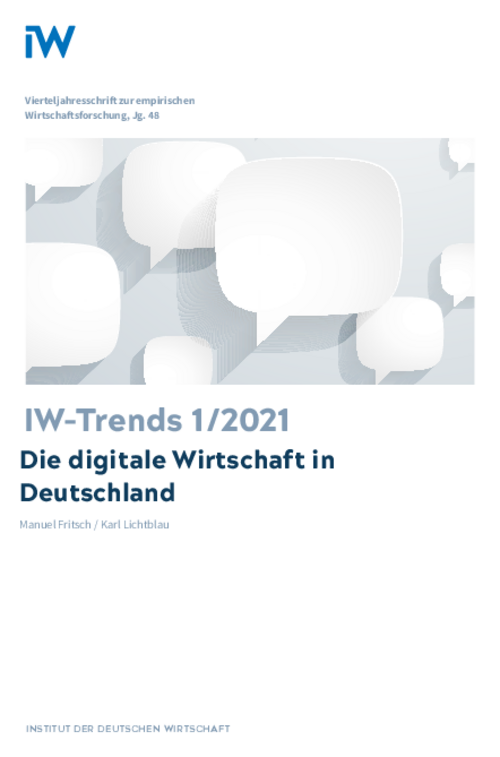For many years now an OECD working group has been developing and coordinating an internationally comparable quantification of the economic effects of digitalization. However, the practical value of this initiative is limited by the nature of the available data.

The Digital Economy in Germany: Limits of Data Availability and First Estimates
IW-Trends

For many years now an OECD working group has been developing and coordinating an internationally comparable quantification of the economic effects of digitalization. However, the practical value of this initiative is limited by the nature of the available data.
A definition and measurement of the US digital economy based on the OECD proposal was published in 2018 by the Bureau of Economic Analysis (BEA), a US statistical agency. Applying the same approach to data from the German national accounts suggests that in 2016 the digital economy contributed 5.7 per cent of Germany’s gross domestic product. While this is significantly less than the 7.8 per cent measured by the BEA for the USA, the difference is partly due to the measuring strategy adopted. This is because the BEA’s approach primarily captures the value added of the information and communication technology sector plus services of a particularly digital nature such as e-commerce. This focus on enablers of digitalisation and products that would not be possible without it fails to take account of digital value creation in traditional business models. In a survey based on the IW Future Panel which included the proportion of digital value creation contributed by additional products, services and especially processes, companies in Germany estimated that an average of around 22.5 per cent of their 2020 turnover was digital. To obtain a comprehensive picture of how digitalised business has become, it will be necessary to address the lack of data specifically on the digitalisation of processes.

Manuel Fritsch, Karl Lichtblau: Die digitale Wirtschaft in Deutschland - Grenzen der Datenverfügbarkeit und erste Schätzungen
IW-Trends

More on the topic

Data Utilisation and Data Sharing: The Potential and the Reality in German Companies
Companies that store their data extensively in digital form, process it in a structured manner and use it in a variety of ways can become particularly efficient members of the data economy.
IW
The Law and Economics of the Data Economy: Introduction to the Special Issue
This article intends to provide a framework to better understand the economic problems and legal challenges resulting from the transition of the European economy to a data economy.
IW